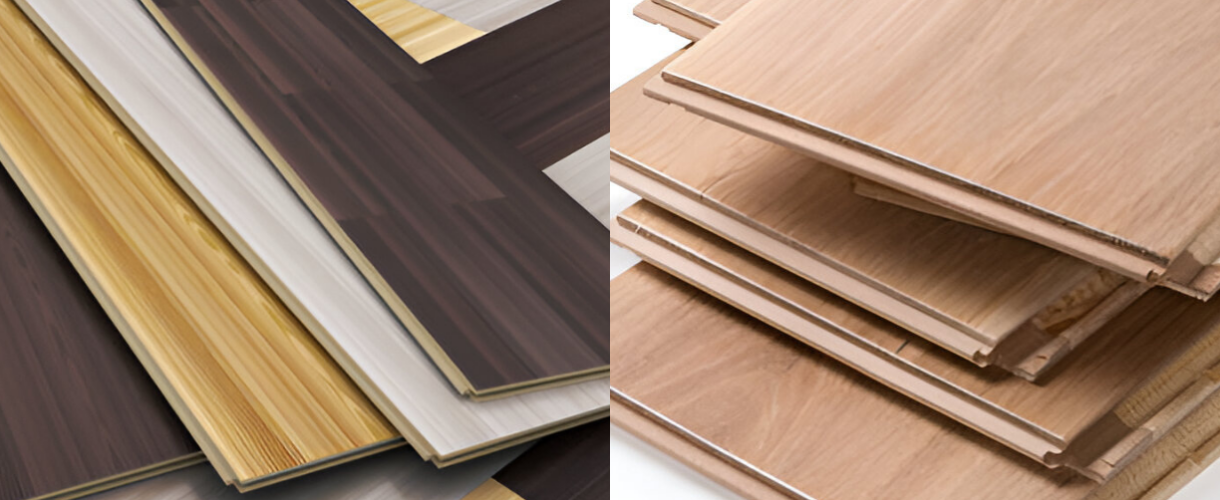The perfect home needs the perfect floor! However, the perfect floor has remained an elusive concept. However, two options have come close to this definition, sparking a brand-new debate – engineered hardwood vs laminate! Both these floors bring in their own set of pros and cons. But how to choose?
Worry not! Here’s a detailed analysis of both these flooring options to help you make the right choice…
Key Takeaways
- Engineered Hardwood combines a thin layer of solid hardwood with a core from plywood.
- Such flooring gets enhanced resistance to environmental changes.
- Laminate flooring is a synthetic flooring product that imitates the appearance of natural materials.
- This flooring is developed by fusing various layers.
- Engineered hardwood is much more cost-effective than solid hardwood floors.
- Laminate flooring is the most cost-effective flooring material out there.
What is Engineered Hardwood Flooring?
Do you know what are engineered floors? These aim to combine the aesthetics of real wood with enhanced stability and durability. Its top layer contains a thin veneer of real hardwood to provide an authentic look and feel. Under this, a core layer and backing layer made of plywood add support and moisture resistance.
Engineered Hardwood Flooring: Pros and Cons
To better understand how manufactured hardwood or engineered hardwood floors fare against laminate floors, it’s important to gain an understanding of their pros and cons…
Pros
- Stability: This floor is constructed with multiple layers of wood, thus protecting against warping, cupping, or gapping.
- Aesthetic Appeal: Engineered hardwood closely resembles traditional hardwood. This is true in appearance and feel.
- Cost Effectiveness: Compared to actual solid hardwood floors, engineered hardwood provides a more value-for-money experience.
Cons
- Refinishing Limitations: Depending on the thickness of the veneer layer, engineered hardwood floors can only be refinished once or twice.
- Moisture Sensitivity: This floor is much more resistant to moisture than solid wood. However, that is not a guarantee of waterproofness. Excessive moisture will cause damage.
- Chemical Off-Gassing: The adhesives used in the manufacturing of engineered hardwood can sometimes emit volatile organic compounds (VOCs), leading to chemical off-gassing.
What Is Laminate Flooring?
It’s important to realize that engineered hardwood vs laminate itself is a debate due to what laminate flooring is. These are a multi-layer synthetic flooring product. These layers add both resilience and aesthetics to a laminate floor.
Laminate Flooring: Pros and Cons
The debate between laminate vs engineered hardwood can only be settled once you know what laminate floors bring to the table…
Pros
- Affordability: This is by far the most affordable flooring option available. Laminate floors are a must-have for the budget-conscious customer.
- Durability: The design of laminate floors allows for handling heavy wear and tear. No need to worry about scratches, dents, or stains.
- Easy Maintenance: All you need to do is sweep and vacuum occasionally, along with a damp mopping. This will keep your laminate floors clean.
Cons
- Sound Quality: Laminate floors tend to produce a hollow sound when walking. This is not as appealing as the natural acoustics of hardwood.
- Non-Refinishable: Solid hardwood floors can be sanded if signs of wear start showing up. However, laminate floors need to be replaced outright.
- Slippery Surface: A wet laminate floor is quite slippery. It’s best to be cautious if you choose laminate floors.
Which Flooring is Best: Engineered Hardwood or Laminate?
What is the best way to analyze the engineered hardwood vs laminate situation? We know the individual pros and cons of both materials, along with what they can do for your home! It is now time to compare and contrast both materials against each other, thus making the final choice for you clearer…
Maintenance and Care
Engineered hardwood requires thorough cleaning routines to maintain its appearance. Beyond sweeping and vacuuming, a damp mop with wood-safe cleaner is also required. Laminate floors have comparatively lesser maintenance requirements, calling only for occasional sweeping and cleaning.
Appearance and Comfort
Due to featuring real wood veneer, engineered hardwood naturally provides a more authentic look and feel. Laminate can only mimic wood through advanced printing. It lacks the actual texture of real wood.
Aesthetics and Design Options
Engineered hardwood offers a wide range of styles, colors, and finishes that cater to various design preferences. However, the synthetic nature of laminate floors allows numerous designs and replicas.
Lifespan
With proper care, engineered hardwood can last between 20 to 30 years or more. Laminate unfortunately lacks the required longevity, lasting only about 15 years.
Installation
Engineered hardwood is quite a complicated material. It thus requires more professional expertise to be installed correctly. Laminate installation process is quite easy as they can be installed in a DIY manner too!
Cost Considerations
Engineered hardwood is much more expensive than laminate flooring. However, this is balanced by it lasting much longer. Laminate is quite a budget-friendly option and has a low barrier of entry. But it might not last as long as you want.
Final Thoughts
The ultimate call on engineered hardwood or laminate floors can only be made by you! What fits your needs better? Are your priorities pure aesthetics or easy maintenance? Is cost-effectiveness important for you? By asking yourself these questions, you will be better able to identify the perfect floor type for your home! For high-quality flooring options and expert guidance, visit MyNewFloor.com today to explore their extensive range of products and make your flooring dreams a reality!
